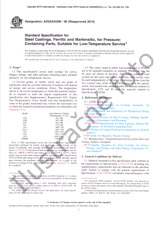Potrebujeme váš súhlas na využitie jednotlivých dát, aby sa vám okrem iného mohli ukazovať informácie týkajúce sa vašich záujmov. Súhlas udelíte kliknutím na tlačidlo „OK“.
ASTM A763-15(2021)
Standard Practices for Detecting Susceptibility to Intergranular Attack in Ferritic Stainless Steels
NORMA vydaná dňa 1.9.2021
Informácie o norme:
Označenie normy: ASTM A763-15(2021)
Poznámka: NEPLATNÁ
Dátum vydania normy: 1.9.2021
Kód tovaru: NS-1036728
Počet strán: 11
Približná hmotnosť: 33 g (0.07 libier)
Krajina: Americká technická norma
Kategória: Technické normy ASTM
Kategórie - podobné normy:
Anotácia textu normy ASTM A763-15(2021) :
Keywords:
copper sulfate, corrosion testing, etch structures, ferritic stainless steel, ferric sulfate, intergranular corrosion, oxalic acid,, ICS Number Code 77.140.20 (Steels of high quality)
Doplňujúce informácie
| 1. Scope | ||
|
1.1?These practices cover the following four tests: 1.1.1?Practice WOxalic acid etch test for detecting susceptibility to intergranular attack in stabilized ferritic stainless steels by classification of the etching structures (see Sections 3 10). 1.1.2?Practice XFerric sulfate-sulfuric acid test for detecting susceptibility to intergranular attack in ferritic stainless steels (Sections 11 16). 1.1.3?Practice YCopper-copper sulfate-50 % sulfuric acid test for detecting susceptibility to intergranular attack in ferritic stainless steels (Sections 17 22). 1.1.4?Practice ZCopper-copper sulfate-16 % sulfuric acid test for detecting susceptibility to intergranular attack in ferritic stainless steels (Sections 23 29). 1.2?The following factors govern the application of these practices 1.2.1?Practice W, oxalic acid test, is a rapid method of identifying, by simple electrolytic etching, those specimens of certain ferritic alloys that are not susceptible to intergranular corrosion associated with chromium carbide precipitation. Practice W is used as a screening test to avoid the necessity, for acceptable specimens, of more extensive testing required by Practices X, Y, and Z. See Table 1 for a listing of alloys for which Practice W is appropriate. 1.2.2?Practices X, Y, and Z can be used to detect the susceptibility of certain ferritic alloys to intergranular attack associated with the precipitation of chromium carbides or nitrides. 1.2.3?Practices W, X, Y, and Z can also be used to evaluate the effect of heat treatment or of fusion welding on susceptibility to intergranular corrosion. 1.2.4?Table 2 lists the identification ferritic stainless steels for which data on the application of at least one of the standard practices is available. 1.2.5?Some stabilized ferritic stainless steels may show high rates when tested by Practice X because of metallurgical factors not associated with chromium carbide or nitride precipitation. This possibility must be considered in selecting the test method. Combinations of alloys and test methods for which successful experience is available are shown in Table 1. Application of these standard tests to the other ferritic stainless steels will be by specific agreement between producer and user. 1.3?Depending on the test and alloy, evaluations may be accomplished by weight loss determination, microscopical examination, or bend test (Sections 30 and 31). The choices are listed in Table 1. 1.4?This standard does not purport to address all of the safety concerns, if any, associated with its use. It is the responsibility of the user of this standard to establish appropriate safety, health, and environmental practices and determine the applicability of regulatory limitations prior to use. 1.5?This international standard was developed in accordance with internationally recognized principles on standardization established in the Decision on Principles for the Development of International Standards, Guides and Recommendations issued by the World Trade Organization Technical Barriers to Trade (TBT) Committee. |
||
| 2. Referenced Documents | ||
|




 Cookies
Cookies
